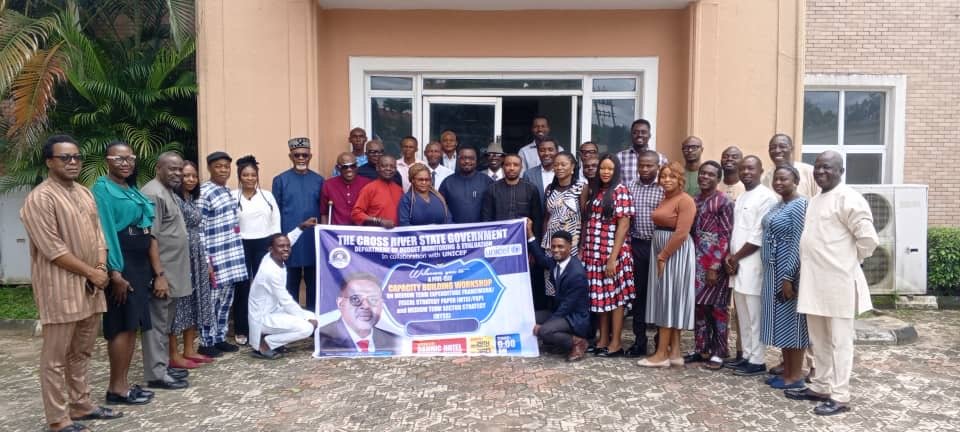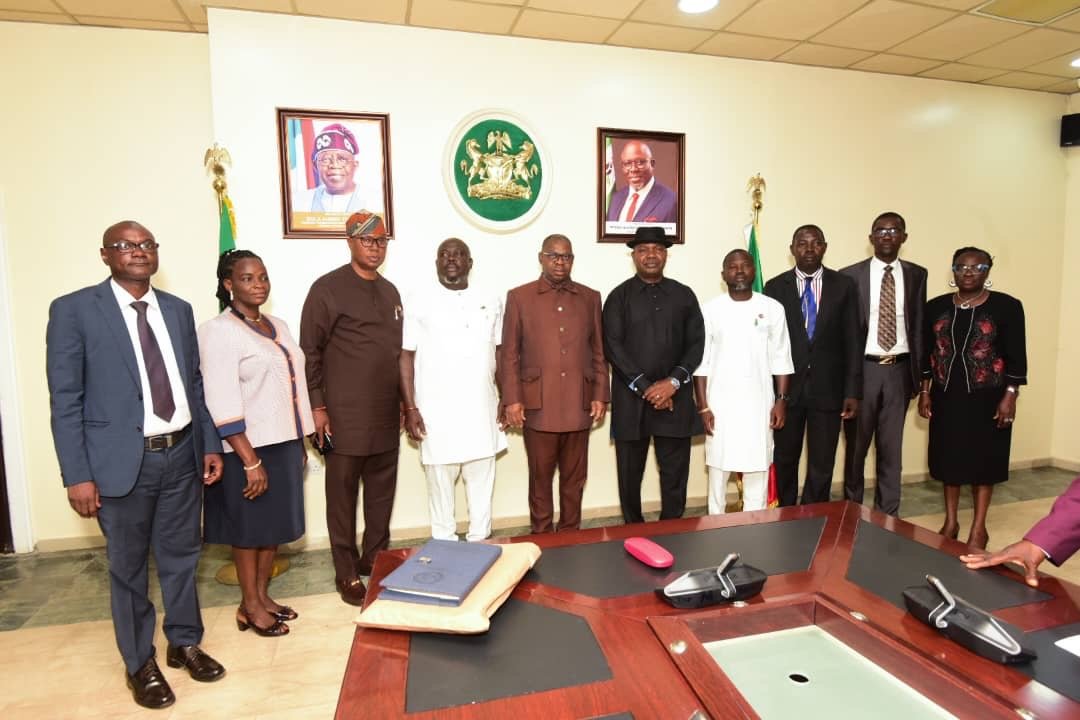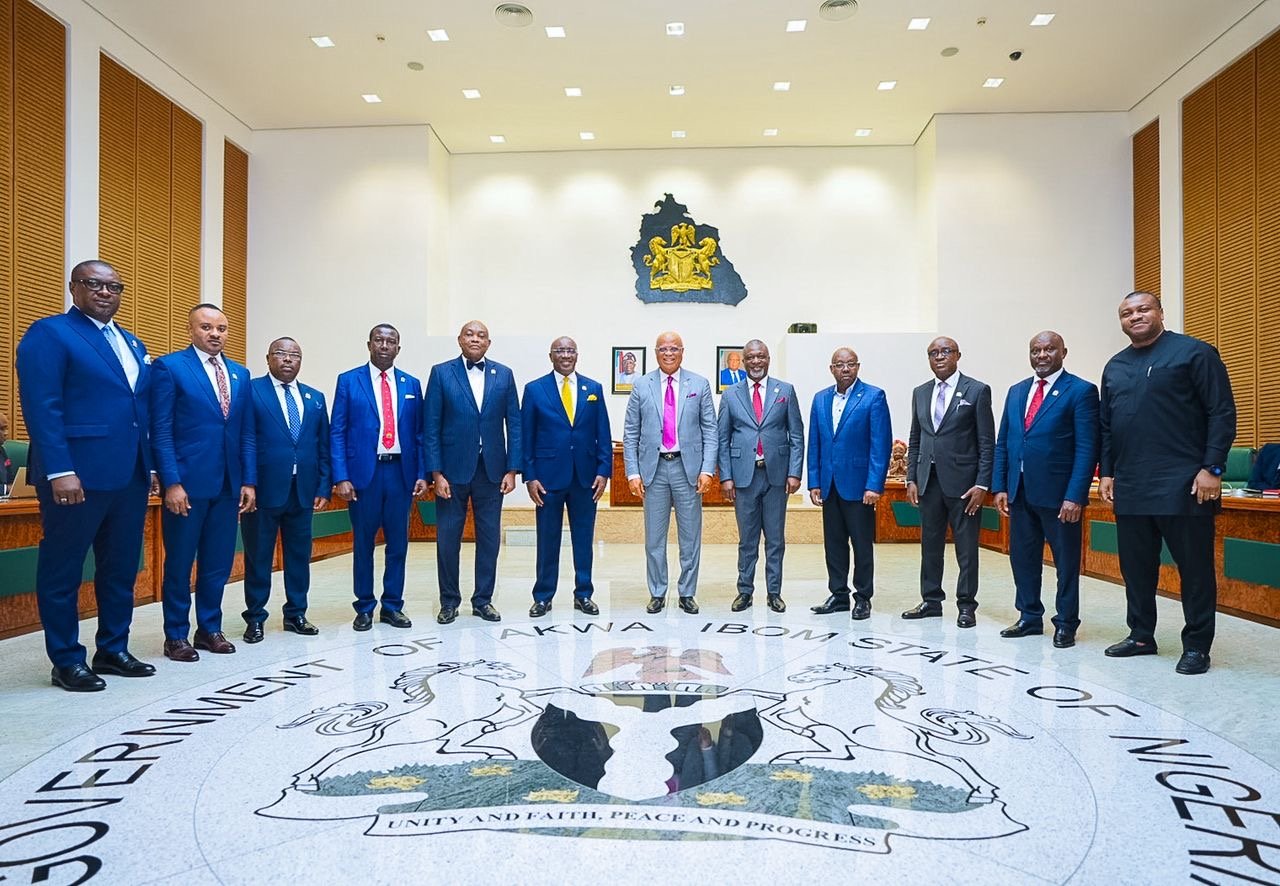Top officials and participants at the Presentation of CRS Medium Term Expenditure Framework (2026-2028) and Development of the Medium-Term Sector Strategy in Calabar on Monday.
By Anietie Akpan
Following meaningful partnership with the United Nations Children’s Fund (UNICEF), Cross River State government budget performance has hit 35 percent as at close of business in second quarter of 2025.
The Special Adviser to the State Governor on Budget, Mr. Otu Otu Ita, said this on Monday, September 29 in an interview session with some newsmen at the ongoing “Presentation of CRS Medium Term Expenditure Framework (2026-2028) and Development of the Medium-Term Sector Strategy” at Danic hotel, Calabar sponsored by UNICEF.
As results of the support of UNICEF, he said, “I think from 2021 we have actually strengthened our processes but we will continue to improve. Our 2024 budget performed about 85 percent and for 2025, the budget we are currently implementing as at close of the business in second quarter of 2025, we had about 35 percent budget performance. We are hoping that we will do about 90 percent at the end of the year.
“We are very hopeful because we had reasons to review 2025 budget sometime in the month of June and that bill was signed into law in the month of August. The reason why we had that new law is because we had new revenue projections and we had guarantee such as the revenue that were coming into Cross River State. So for that reason, we had a supplementary provision of about N104 billion.
“And for us, the supplementary means our budget is already performing and we are very optimistic that the programmes in Cross River State which are all tailored to benefit and impact directly the people living in Cross River State will perform very well”.
Otu said, “that is why we are grateful to UNICEF for putting up this workshop. We are hoping that we will learn best practices in the course of this workshop. And then in terms of our budget performance and basically, the main purpose of this workshop is to strengthen public finance management in Cross River State”.
On expectations, he said, “our expectation is that, we are actually going to have a technical session where budget officers in Cross River State and planning recession statistics officers in Cross River State will be taught the rudiment of budgeting.
“We want to ensure that we have a plan-based budgeting in Cross River State where it will match our revenue to our expenditure were allocations of resources will not just be based on any assumption except on proper economic analysis.
On leakages he said, “because of our public finance management is being structured in Cross River State, we rarely have issues of leakages because from the approval stage, you have a proper due diligence being followed before releases are made. And even after releases are made, when expenditure are being incurred, there is also several things including the Cross River State Assembly which has the responsibility of oversight and even Budget Office, Ministry of Finance, the Auditor General and also there is a dedicated office that is called, Project Monitoring and Evaluation that also monitor state’s activities”.
Delivering his speech at the opening of the workshop, the Social Policy Officer for UNICEF, Enugu Field Office, Dr Victor Chima, stated that there has been ongoing projects support for social protection and effective budget by UNICEF.
Chima who spoke on behalf of the Chief of UNICEF Field Office, Enugu, Mrs. Juliet Chiluwe, said UNICEF is ready to support beyond this process as this effort will help the state and “we promise continued support”.
Fielding questions from newsmen in an interview session, Chima, said UNICEF, Enugu Field Office is “supporting eight states within the country, including Cross River where we are today having an engagement with participants.
“We are supporting Cross River state in terms of strengthening the public financial management system through capacity building for the medium-term expenditure framework and the medium-term sector strategies for WASH, education, social protection, and health”.
He explained that the workshop “is an effort to help build the capacity of the budget officers across the ministries, agencies, and departments, and also help in terms of enhancing public financial management for key Programme areas, most especially the social service sectors, which is of interest to UNICEF in the terms that it is the area that is very important and that supports the survival and livelihood of women and also children, which is an area that UNICEF works particularly in”.
On whether UNICEF is satisfied with the state’s implementation of its budget so far, Chima said, “we had an engagement where we also supported the state in terms of a review of the medium-term performance of the state. Of course, there are all rooms for improvement, but the state so far has been able to enhance the implementation level.
“We have seen an increment, particularly revenues come up, and we have seen that most of the social sectors to an extent have been implemented according to what is in the state development plan, because I am very sure the state is operating, most of them based on the tenets and activities within the state development plan, which UNICEF supported to develop, and some key activities have been implemented”.
However, he added that there are also rooms for improvement, and that is why the continued support to the state in terms of improving these budgetary processes and implementation processes are being provided to the state”.
He said part of the rooms for improvement is like the ongoing workshop to have a medium-term expenditure framework that will be developed in line with the priorities of the state, and also have sectoral strategies that would prioritize key elements of the population in terms of what the social services should be, and the social service sectors, especially for health, wash, education, and social protection.
“So, we expect that budgetary allocations will be improved for these sectors. We expect that the priorities or activities and programmes will be tailored towards the key elements of the state’s priorities and state development plan, and we expect that with more advocacy, there will be appropriate release of funds, and that implementation will be guided according to best practices”.
In his presentation, one of the resource persons, Mr. Oluwasola Omoju who is an expert in Public Finance Management, gave an “Overview of the budget and Appropriation Process”, said “the budget process in Nigeria is broken”, that is “not delivering on what is supposed to”.
He said in most cases much is budgeted and spent on capital expenditure yet the level of unemployment remains high.
He warned that, “if funds are not properly spent we will not get results.
Budget is for the people but when they don’t feel the impact you have lost them… If you are not realistic with your budget you can run into problems”.
He pointed out that “over the years, our budget in Nigeria has not really had impact on the life of the people” whereas “our budget needs to reflect priorities, because you are not developing budget for yourself but the people”











